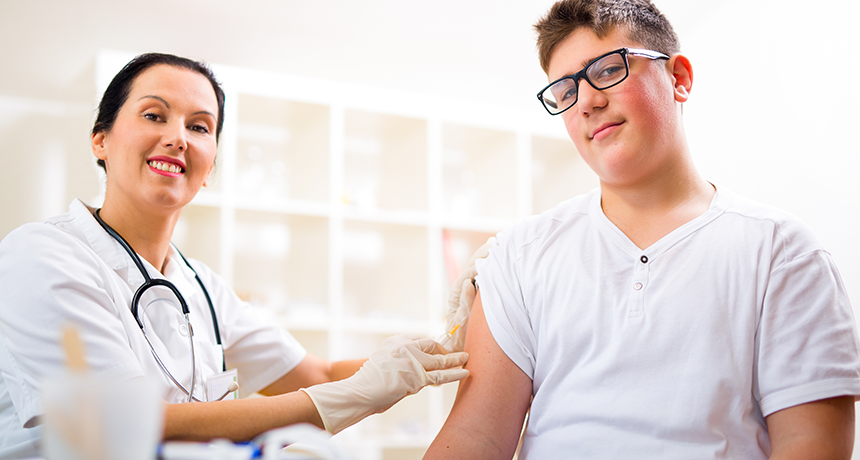Genes may predict how well the flu vaccine will work in young people
Nine genes are like a crystal ball for those 35 and under, but not older adults

A set of nine genes can signal whether a young adult will have a strong response to the flu vaccine, a new study finds.
Jovanmandic/istockphoto
A genetic “crystal ball” can predict whether the flu vaccine will work well for certain people.
Nine genes are tied to a strong immune response to the flu vaccine in people 35 and under, a new study finds. If these genes are highly active before vaccination, a person will respond to the flu shot by making lots of antibodies. This is true no matter what flu variety, or strain, is in the vaccine. The response can help a person avoid getting the flu.
Getting a flu shot is the best way to stay healthy during flu season. The U.S. Centers for Disease Control and Prevention estimates that flu vaccines prevented 5.1 million illnesses in the 2015‒2016 season. “The problem is, we don’t know what makes a successful vaccination,” says Purvesh Khatri. He’s an immunologist at Stanford University School of Medicine in California. “The immune system is very personal,” he says.
Khatri and colleagues wondered if a person’s immune system needs to be in a certain state to respond well to the flu vaccine. So the researchers looked at blood samples from 175 people around the United States. They had different genetic backgrounds. They also had gotten the flu shot in different seasons. The scientists searched the blood samples for a common genetic signal. They found nine genes that were especially active in people 35 or under and whose blood showed a strong immune response to the flu vaccine.
After identifying these genes, the team used another 82 blood samples to double-check that the genes predicted a good response to the flu vaccine. Using a variety of samples makes it more likely that this crystal ball will work for many different people in the real world, Khatri says. The researchers reported their findings online August 25 in Science Immunology.
The nine genes make proteins that have various jobs. They do things like telling other proteins where to go and giving structure to cells. Earlier research has tied some of these genes to the immune system. Khatri thinks the new study will lead to more research into how these genes encourage a good vaccine response. And figuring out how to boost the genes may help people who don’t respond strongly to flu vaccines, he says.
The research team looked for a similar set of genes in people aged 60 and over. In older people, the flu is more likely to lead to serious complications, such as a lung disease known as pneumonia. But the scientists couldn’t find a set of genes in this group that predicted flu-vaccine responses.
Even so, the study is “a step in the right direction,” says Elias Haddad. He’s an immunologist at Drexel University College of Medicine in Philadelphia, Pa. He was not part of the new research. Maybe a simple test before a vaccination could help predict who will respond well to the flu shot, he says.
As for finding a genetic crystal ball for older adults, “there’s still hope that we’ll be able to,” says Raphael Gottardo. He’s a computational biologist at the Fred Hutchinson Cancer Research Center in Seattle, Wash. He worked on the new study. Older people have a wider range of responses to the flu vaccine than do younger people, he says. That means it may take a larger group of samples to find a genetic pattern.
It will also take more research to learn whether the nine genes predict a strong response for all vaccines, or just the flu shot, Haddad says. “There is a long way to go here.”







